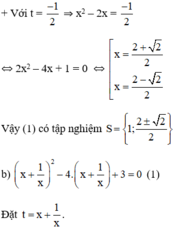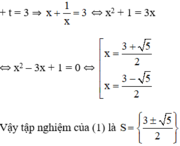Tìm số nguyên x biết
a) (3x2 + 1 ) . ( x - 2 ) > 0
b) 2x2 . (x + 1) > 0
Hãy nhập câu hỏi của bạn vào đây, nếu là tài khoản VIP, bạn sẽ được ưu tiên trả lời.


a) 2 x 2 − 2 x 2 + 3 x 2 − 2 x + 1 = 0 ( 1 )
Đặt x 2 – 2 x = t ,
(1) trở thành : 2 t 2 + 3 t + 1 = 0 ( 2 ) .
Giải (2) :
Có a = 2 ; b = 3 ; c = 1
⇒ a – b + c = 0
⇒ (2) có nghiệm t 1 = - 1 ; t 2 = - c / a = - 1 / 2 .
+ Với t = -1 ⇒ x 2 − 2 x = − 1 ⇔ x 2 − 2 x + 1 = 0 ⇔ ( x − 1 ) 2 = 0 ⇔ x = 1

(1) trở thành: t 2 – 4 t + 3 = 0 ( 2 )
Giải (2):
Có a = 1; b = -4; c = 3
⇒ a + b + c = 0
⇒ (2) có nghiệm t 1 = 1 ; t 2 = c / a = 3 .
+ t = 1 ⇒ x + 1/x = 1 ⇔ x 2 + 1 = x ⇔ x 2 – x + 1 = 0
Có a = 1; b = -1; c = 1 ⇒ Δ = ( - 1 ) 2 – 4 . 1 . 1 = - 3 < 0
Phương trình vô nghiệm.


a) \(\Rightarrow\left(x-1\right)\left(3x+5\right)=0\Rightarrow\left[{}\begin{matrix}x=1\\x=-\dfrac{5}{3}\end{matrix}\right.\)
b) \(\Rightarrow x\left(x-1\right)-2\left(x-1\right)=0\Rightarrow\left(x-1\right)\left(x-2\right)=0\Rightarrow\left[{}\begin{matrix}x=1\\x=2\end{matrix}\right.\)

1)
a) \(=15x^3-20x^2+10x\)
b) \(=3x^4-x^3+4x^2-9x^3+3x-12x=3x^4-10x^3+4x^2-9x\)
2)
a) \(\Rightarrow x\left(x^2-6x+12\right)=0\)
\(\Rightarrow x=0\)(do \(x^2-6x+12=\left(x^2-6x+\dfrac{36}{4}\right)+3=\left(x-\dfrac{6}{2}\right)^2+3\ge3>0\))
b) \(\Rightarrow\left(x+3\right)^3=0\Rightarrow x=-3\)
(3x²-5x+2)+(3x²+5x)= bao nhiêu ạ
Giúp em vs ạ . Em cảm ơn

\(a,\Leftrightarrow2x^2+10x-2x^2=12\Leftrightarrow x=\dfrac{12}{10}=\dfrac{6}{5}\\ b,\Leftrightarrow\left(5-2x-4\right)\left(5-2x+4\right)=0\\ \Leftrightarrow\left(1-2x\right)\left(9-2x\right)=0\Leftrightarrow\left[{}\begin{matrix}x=\dfrac{1}{2}\\x=\dfrac{9}{2}\end{matrix}\right.\\ c,\Leftrightarrow3x^2-3x^2+6x=36\Leftrightarrow x=6\\ d,\Leftrightarrow2\left(x+5\right)-x\left(x+5\right)=0\\ \Leftrightarrow\left(2-x\right)\left(x+5\right)=0\Leftrightarrow\left[{}\begin{matrix}x=2\\x=-5\end{matrix}\right.\\ e,\Leftrightarrow4x^2-4x+1-4x^2+196=0\\ \Leftrightarrow-4x=-197\Leftrightarrow x=\dfrac{197}{4}\)
\(f,\Leftrightarrow x^2+8x+16-x^2+1=16\Leftrightarrow8x=-1\Leftrightarrow x=-\dfrac{1}{8}\\ g,Sửa:\left(3x+1\right)^2-\left(x+1\right)^2=0\\ \Leftrightarrow\left(3x+1-x-1\right)\left(3x+1+x+1\right)=0\\ \Leftrightarrow2x\left(4x+2\right)=0\Leftrightarrow\left[{}\begin{matrix}x=0\\x=-\dfrac{1}{2}\end{matrix}\right.\\ h,\Leftrightarrow x^2+8x-x-8=0\\ \Leftrightarrow\left(x+8\right)\left(x-1\right)=0\Leftrightarrow\left[{}\begin{matrix}x=1\\x=-8\end{matrix}\right.\\ i,\Leftrightarrow2x^2-13x+15=0\\ \Leftrightarrow2x^2+2x-15x-15=0\\ \Leftrightarrow\left(x+1\right)\left(2x-15\right)=0\Leftrightarrow\left[{}\begin{matrix}x=-1\\x=\dfrac{15}{2}\end{matrix}\right.\)

a)\(3x\left(x-1\right)+2x^2\left(x-1\right)=0\\ \Leftrightarrow x\left(x-1\right)\left(3+2x\right)=0\\ \Leftrightarrow\left\{{}\begin{matrix}x=0\\x-1=0\\3+2x=0\end{matrix}\right.\Leftrightarrow\left\{{}\begin{matrix}x=0\\x=1\\x=\dfrac{-3}{2}\end{matrix}\right.\)
a: Ta có: \(3x^2-3x+2x^3-2x^2=0\)
\(\Leftrightarrow2x^3+x^2-3x=0\)
\(\Leftrightarrow x\left(2x^2+x-3\right)=0\)
\(\Leftrightarrow x\left(x-1\right)\left(2x+3\right)=0\)
\(\Leftrightarrow\left[{}\begin{matrix}x=0\\x=1\\x=-\dfrac{3}{2}\end{matrix}\right.\)
b: Ta có: \(x^3+27=-x^2+9\)
\(\Leftrightarrow\left(x+3\right)\left(x^2-3x+9\right)+\left(x+3\right)\left(x-3\right)=0\)
\(\Leftrightarrow\left(x+3\right)\left(x^2-3x+9+x-3\right)=0\)
\(\Leftrightarrow x+3=0\)
hay x=-3

\(b,\Rightarrow\left(x+2\right)\left(x+2-x+3\right)=0\\ \Rightarrow5\left(x+2\right)=0\\ \Rightarrow x=-2\\ c,\Rightarrow2x\left(x^2-2x+1\right)=0\\ \Rightarrow2x\left(x-1\right)^2=0\\ \Rightarrow\left[{}\begin{matrix}2x=0\\x-1=0\end{matrix}\right.\Rightarrow\left[{}\begin{matrix}x=0\\x=1\end{matrix}\right.\\ d,\Rightarrow\left(x-1-2x-1\right)\left(x-1+2x+1\right)=0\\ \Rightarrow3x\left(-x-2\right)=0\\ \Rightarrow-3x\left(x+2\right)=0\\ \Rightarrow\left[{}\begin{matrix}-3x=0\\x+2=0\end{matrix}\right.\Rightarrow\left[{}\begin{matrix}x=0\\x=-2\end{matrix}\right.\)


a: Ta có: \(40x^4+5x=0\)
\(\Leftrightarrow5x\left(8x^3+1\right)=0\)
\(\Leftrightarrow x\left(2x+1\right)=0\)
\(\Leftrightarrow\left[{}\begin{matrix}x=0\\x=-\dfrac{1}{2}\end{matrix}\right.\)
b: Ta có: \(8x^2-2x-1=0\)
\(\Leftrightarrow8x^2-4x+2x-1=0\)
\(\Leftrightarrow\left(2x-1\right)\left(4x+1\right)=0\)
\(\Leftrightarrow\left[{}\begin{matrix}x=\dfrac{1}{2}\\x=-\dfrac{1}{4}\end{matrix}\right.\)
a)x>2
b)\(x\ge-1\)
tk nha!
P/s: Không ghi phần in nghiêng trong ngoặc đơn.
a) Do \(3x^2+1\ge3.0+1=1>0\forall x\)
Nên để \(\left(3x^2+1\right)\left(x-2\right)>0\) thì \(\left(3x^2+1\right);\left(x-2\right)\) đồng dấu. (đồng dấu ở đây được hiểu là cùng dương hoặc âm)
Tức là \(x-2>0\Leftrightarrow x>2\)
b) \(2x^2\left(x+1\right)\ge0\) nên \(2x^2;x+1\) đồng dấu (đồng dấu ở đây tức là cùng không âm hoặc cùng âm)
Mặt khác: \(2x^2\ge0\forall x\Rightarrow x+1\ge0\)
Hay \(x\ge-1\)